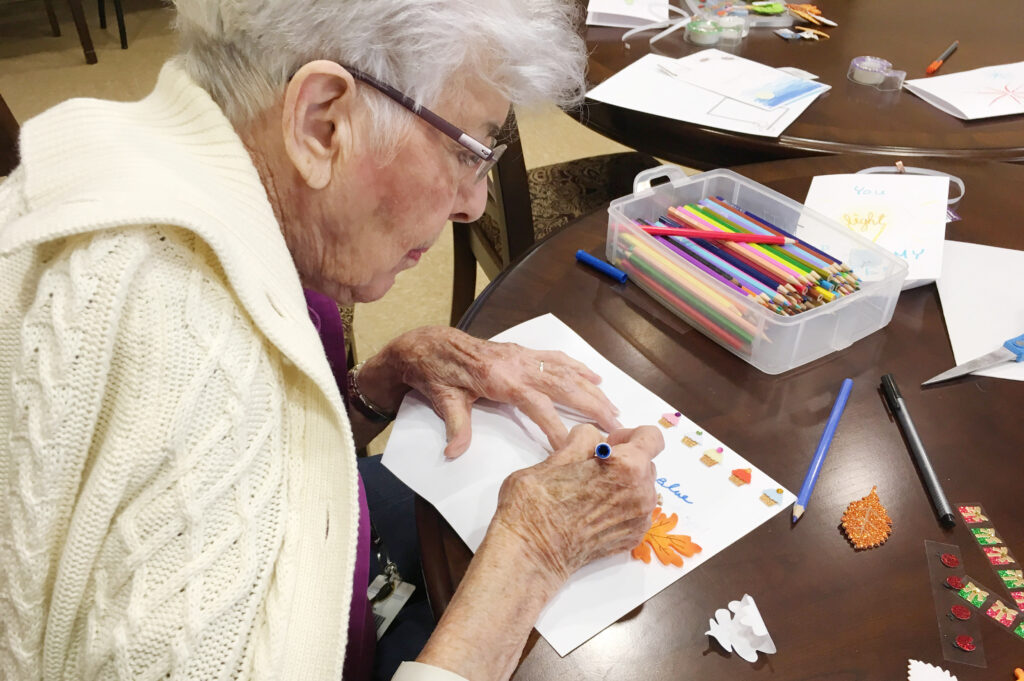Arts in Health and Wellness
Mission
The Institute for Applied Creativity’s Arts in Health program, located within the College of Performance, Visualization and Fine Arts, is dedicated to the practice of health and wellness through the arts, enhancing education and advancing research in arts, health care and education for healthier, more equitable lives for all people.
Vision
The promotion and provision of creative arts to the community. The vision is to inspire and connect with those who have limited access to the arts to enhance their mental and physical well-being.
Aggie Core Values
- Excellence: The field of arts in health is continuously expanding, therefore we seek to continue to improve and advance our field in teaching, research and practice.
- Integrity: Our faculty, staff and students follow ethical standards in research, teaching and practice.
- Leadership: We strive to lead by example and to develop future leaders in the field of arts, health and wellness.
- Loyalty: We are dedicated to our clients, our university and our community to improve individual physical and mental wellness through the arts.
- Respect: Every life has value and potential, therefore we are committed to treat all people with respect.
- Selfless Service: Serving our community through the intersection of the arts, culture and health is essential for better health and wellness for all.
Areas of Expertise
Dance
Dancing is not only a good way to be physically fit, but it is also a great way to challenge the mind through problem-solving and creative activities. Dance is a social activity that helps promote and develop emotional, social and cognitive functions. Dance is one of the few physical activities to be associated with lowering the risk of dementia, and effective in treating depression.
Theatre
Improvisation and creativity in theatre games challenge the mind, enhancing cognitive abilities such as problem-solving, critical thinking and memory. They provide a safe space for individuals to step out of their comfort zones, boosting confidence and self-esteem as participants explore different roles and express themselves. Participating in theatre games fosters teamwork, communication and cooperation. It creates a sense of community and belonging, reducing feelings of isolation and loneliness.
Music
The creative spontaneity of music develops confidence and gives individuals the freedom of self-expression. Music activates many areas of the brain and has been found to positively affect brain development, learning and functioning. These functions include attention, listening, speech production, emotions, motor skills, memory, coordination and decision-making. Music therapy reduces anxiety and stress, regulates moods and energy levels and increases motivation.
Visual/Interactive Art
Visual arts serve as powerful tools for promoting mental and physical well-being, enhancing cognitive functions and fostering social connections. Integrating interactive technology offers significant support and benefits, enhancing accessibility and enabling new modes of expression and engagement.
Activities & Programs
Creative Aging
The research team has worked with local assisted-living facilities, nursing homes and senior centers, initiating a program that integrates interactive art and craft activities. This initiative is specifically designed to nurture the cognitive functions of older adults, foster enriching intergenerational connections and encourage physical engagement. Our research has recently advanced to incorporate artificial intelligence and virtual-reality technologies, with the aim of developing innovative reminiscing tools. These tools are designed to aid older adults experiencing memory impairment by unlocking and stimulating recollections in a supportive, engaging manner.

Web page: Creative Aging
Interactive Touch Workshops
The research team has innovatively designed interactive soft toys and plant pots to enhance tactile experiences for those with limited access to tactile experiences. These items leverage the calming nature of touch, infusing peace and comfort into soft toys and live plants. In workshops, participants can make their own touch-responsive toys or plant systems that produce sensory feedback. Soft toys with LEDs and vibrators react to a child’s touch with soothing patterns, while interactive plants respond to human contact with audio-visual displays. Feedback from workshop participants has been overwhelmingly positive. These interactive creations not only simulate the therapeutic effects of touch, but also deepen the psychological benefits of connecting with textured surfaces and the natural world.
Job Interview Project With Aggie ACHIEVE
AllyChat is a VR application developed to assist individuals with intellectual disabilities in preparing for job interviews. The project utilized a participatory design process, collaborating with students from Aggie ACHIEVE during the initial phase focused on a chatbot. The development was in two stages: First, a conversational AI chatbot underwent testing and received positive user feedback, leading to subsequent refinements. This laid the groundwork for the second phase, transforming AllyChat into an immersive VR experience tailored for mock job interviews. Within the virtual environment, users find themselves fully immersed in an office-lounge setting that replicates a semi-public/private space. Here, individuals can practice responding to job interview questions, creating a secure and supportive space. AllyChat is designed to empower users to refine their interview skills in a comfortable and judgment-free environment.
Student researchers: Miles Versaw (VR developer), Jonathan Back (3D modeler), Rohan Chaudhury (conversational AI developer), Brittany Garcia-Pi (UX researcher/project manager)

Members
Core Faculty Members
Christine Bergeron, director of Arts in Health & Wellness Program, associate dean for academic affairs and clinical professor, dance, College of Performance, Visualization and Fine Arts
Jinsil Hwaryoung Seo, associate professor, Visualization, College of Performance, Visualization and Fine Arts
Alexandra Pooley, assistant professor, Dance, College of Performance, Visualization and Fine Arts
Anne Quackenbush, lecturer, Theatre, College of Performance, Visualization and Fine Arts
Kim Kattari, associate professor, Performance and Visual Studies, College of Performance, Visualization and Fine Arts
Vanessa Reiser, visiting lecturer, Dance, College of Performance, Visualization and Fine Arts
Contact
If you want to work with us, please contact us: creativity@tamu.edu.